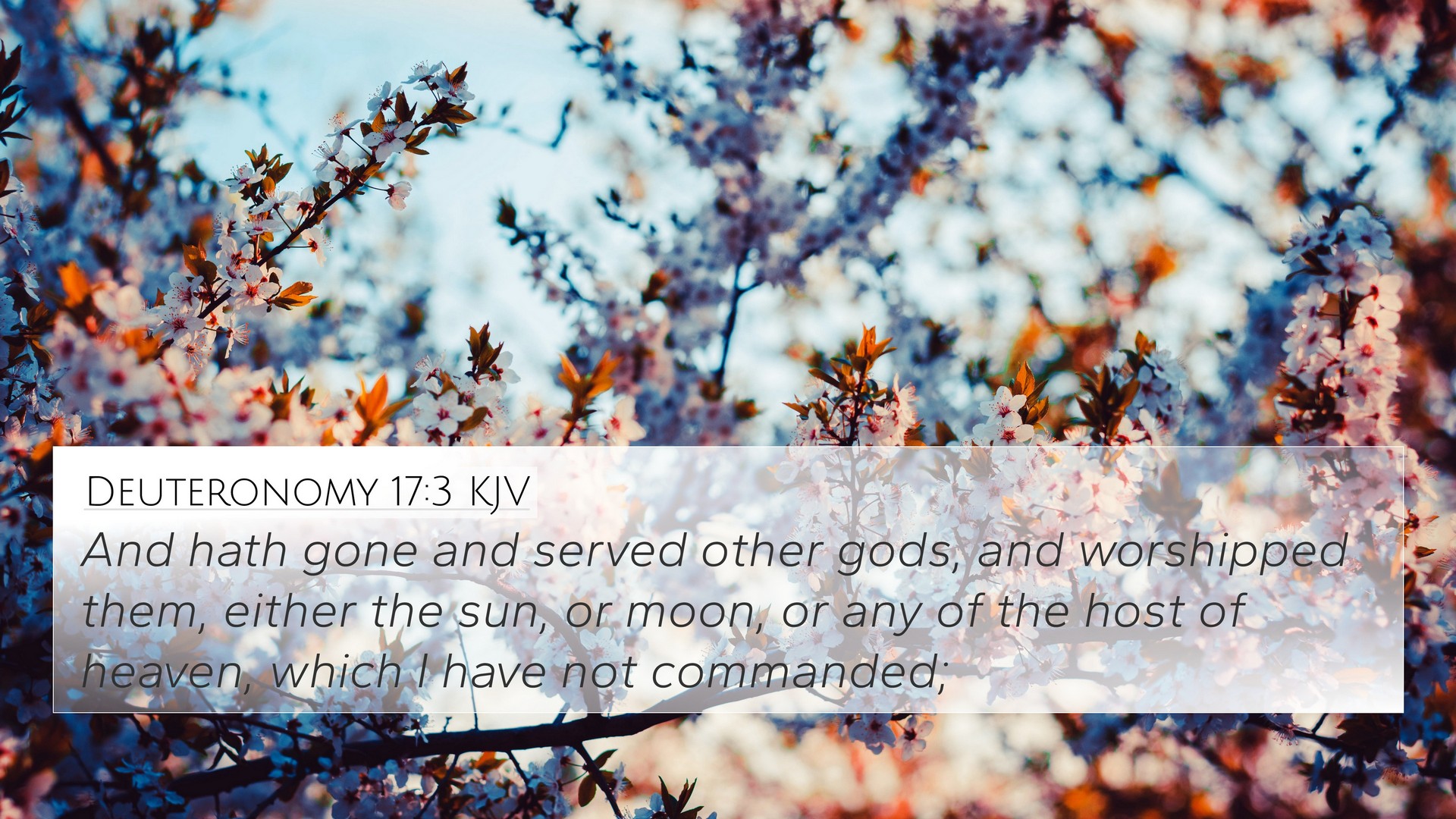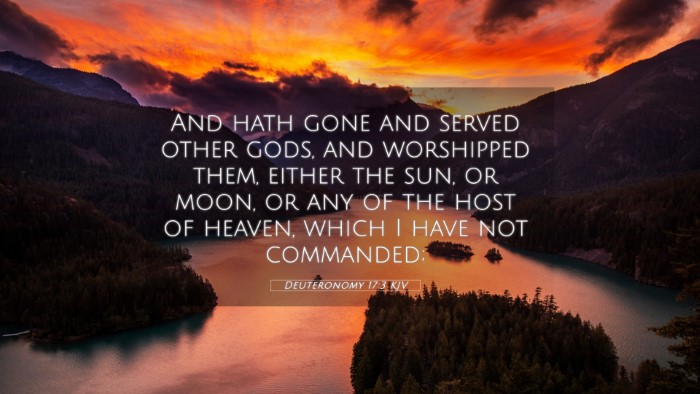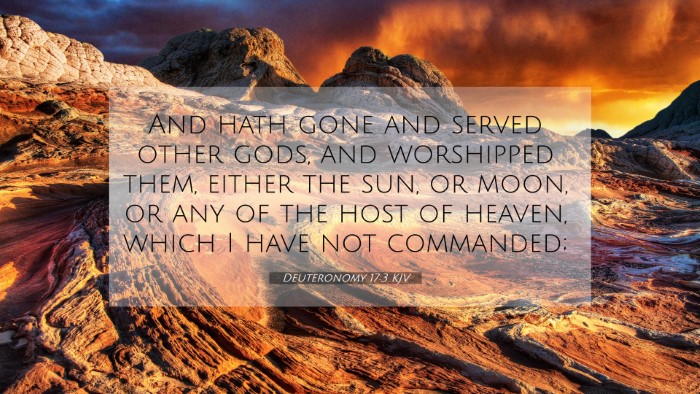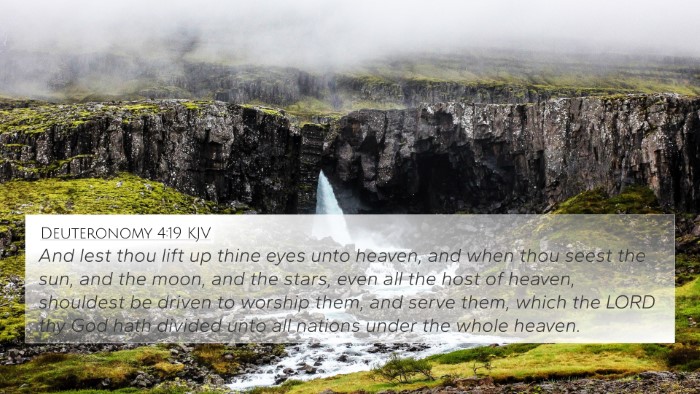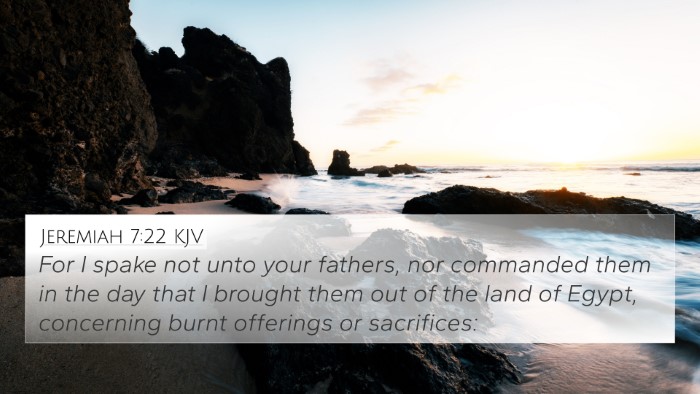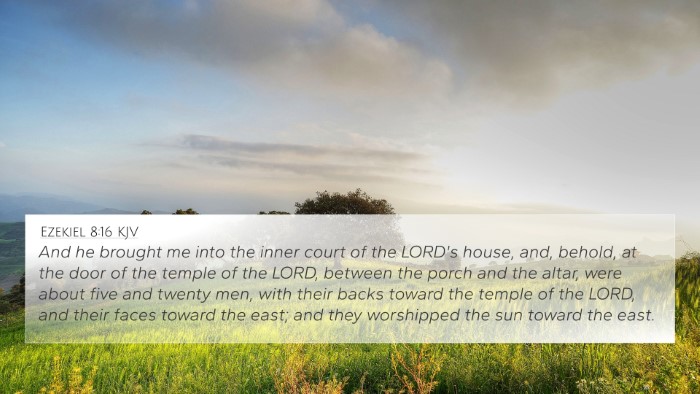Understanding Deuteronomy 17:3
Deuteronomy 17:3 states:
"And hath gone and served other gods, and worshipped them, either the sun, or moon, or any of the host of heaven, which I have not commanded."
This verse addresses the serious issue of idolatry among the Israelites and highlights the strict commandments laid out by God regarding the worship of other deities. This is a foundational verse that underlines the importance of fidelity to the one true God.
Commentary Insights
According to the insights from public domain commentaries:
- Matthew Henry: He emphasizes the gravity of turning to false gods and explains that such actions were not only disobedient but a direct violation of God's commandments. Idolatry represents a breach in the covenant relationship between God and His people.
- Albert Barnes: Barnes elaborates that the worship of celestial bodies (like the sun and moon) was common among neighboring nations and warns the Israelites against these practices. He indicates the temptation of adopting these idolatrous practices in their pursuit of acceptance among other cultures.
- Adam Clarke: Clarke delves into the nature of worship and idolatry, stressing that worship should be directed solely to God as ordained. He highlights the historical context of Israel's struggles with idolatry and how it leads to severe consequences for the nation.
Thematic Bible Verse Connections
Deuteronomy 17:3 connects thematically with several other scripture passages:
- Exodus 20:3: "Thou shalt have no other gods before me." This establishes the prime directive against idolatry.
- Leviticus 26:1: "Ye shall make you no idols nor graven image, neither rear you up a standing image." It further reinforces the command to avoid physical representations of worship.
- Deuteronomy 6:14: "Ye shall not go after other gods, of the gods of the people which are round about you." This warns against the influences of surrounding communities.
- 1 Kings 18:21: The challenge given by Elijah to the Israelites to choose between God and Baal, highlighting the ongoing struggle with idolatry.
- Jeremiah 10:10: "But the Lord is the true God, he is the living God, and an everlasting king." This asserts God's sovereignty over the false gods.
- Isaiah 44:9-20: The folly of idolatry is discussed, portraying the irrationality behind creating gods that cannot save.
- Romans 1:25: "...who changed the truth of God into a lie, and worshipped and served the creature more than the Creator..." Discusses the New Testament perspective on idolatry.
Cross-Referencing Biblical Texts
Employing tools for Bible cross-referencing enables deeper understanding:
- Use of a Bible Concordance: This is instrumental in locating other verses that address idolatry.
- Cross-reference Bible Study: Involves connecting verses to understand themes across both the Old and New Testaments.
- Bible Reference Resources: Such resources help categorize verses by theme, useful for sermon preparation and study.
Application and Reflection
Understanding Deuteronomy 17:3 helps believers reflect on their modern practices regarding worship and idols. The verse urges a self-examination of one’s commitment to God alone, as parallels can be drawn between ancient Israel’s experiences and contemporary challenges.
Believers can ask:
- What are the modern idols in our lives?
- Are there any influences leading us away from true worship?
- How can we uphold the commandment of worshiping only God in our daily lives?
Conclusion
Deuteronomy 17:3 serves as a powerful reminder of the necessity to guard against idolatry and maintain a relationship with the one true God. Cross-referencing this verse with others provides a broader perspective on the significance of worship and the implications of turning away from God.
For deeper studies, using a comprehensive Bible cross-reference guide can facilitate a more profound understanding of how scripture reinforces the message of fidelity to God throughout biblical history.
